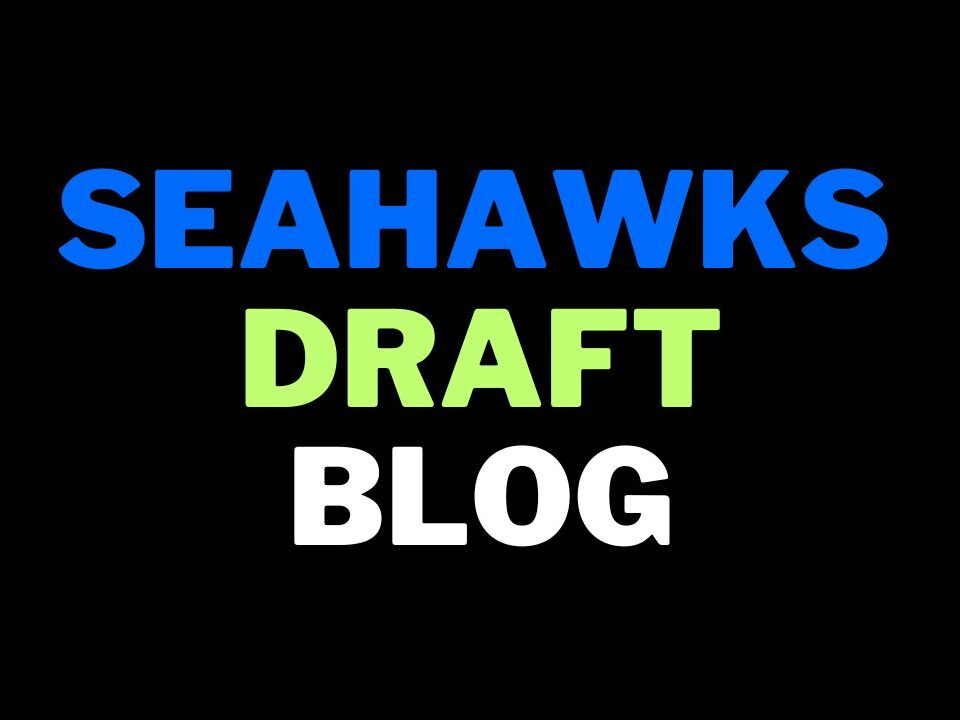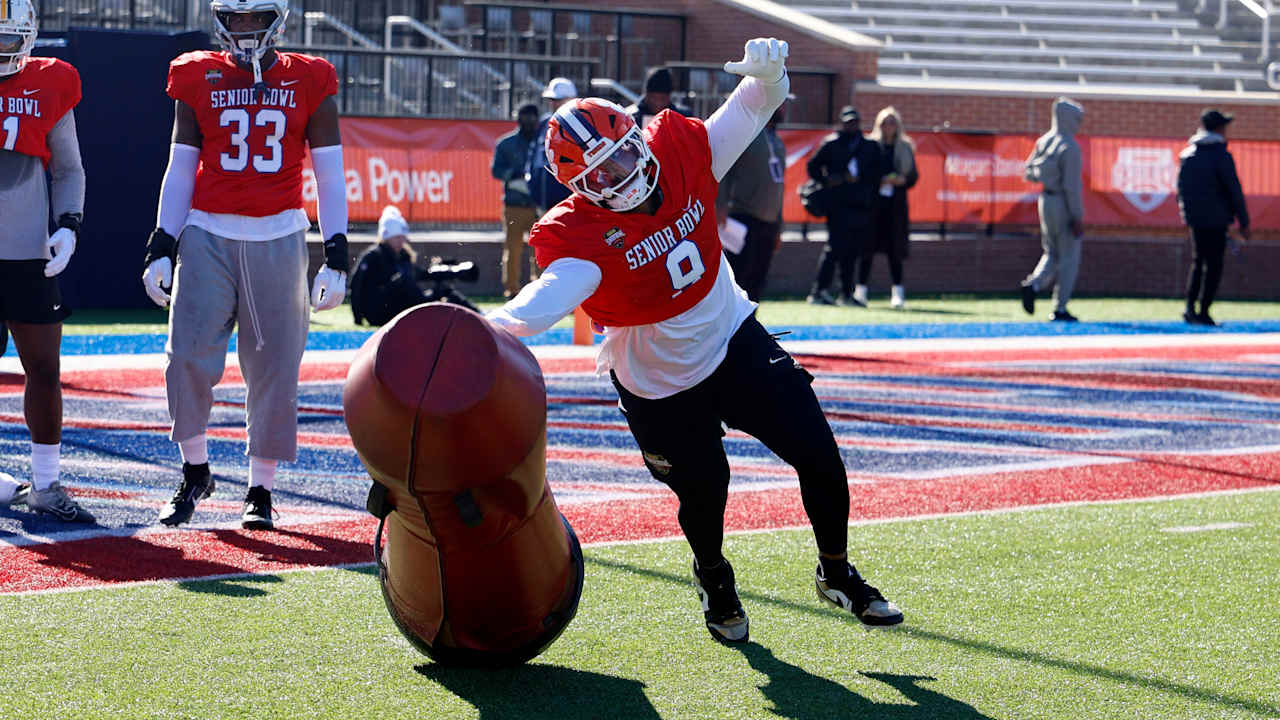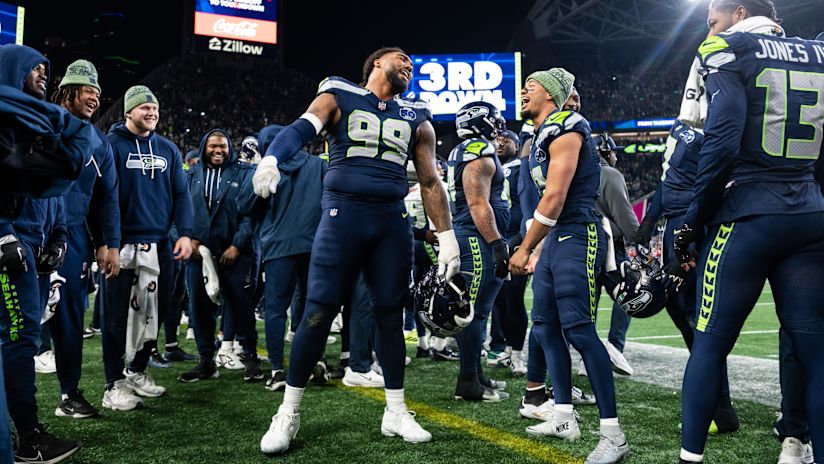Please note — I’m at the mercy of the footage I can access. This includes the NFL Network’s live coverage and whatever is uploaded to YouTube. I don’t see everything — but have watched all of the 1v1’s for the offensive and defensive linemen.
Standouts based on the tape I saw
Gennings Dunker (T, Iowa)
Zion Young (DE, Missouri)
Rayshaun Benny (DT, Michigan)
Sam Hecht (C, Kansas State)
Jake Slaughter (C, Florida)
Demetrius Crownover (T, Texas A&M)
Taylen Green (QB, Arkansas)
National team OL vs DL 1v1 notes
Iowa lineman Gennings Dunker showed a forceful punch to the chest on his first 1v1 rep against Vincent Anthony of Duke. He widened the route to the quarterback, then showed good footwork to seal off the edge.
His second rep came at right guard against Zane Durrant. Wow. His base looks like a truck, his feet are quick and in control and he so easily got into position to intercept Durrant — clamping his hands inside to finish.
He then took on Nadame Tucker and handled the edge against his speed (Tucker is a smaller, quicker EDGE rusher).
I’m sold after one day. In this down-year of a draft, Gennings Dunker should be a high pick. He is a plug-and-play starter at guard and potentially right tackle. There’s absolutely no reason, looking at him today, to think he’s going to be a poor tester. He should go in the top-25 of this draft. Dunker just looks different out there.
Bryson Eason of Tennessee demolished guard Jalen Farmer with a vicious club move. Farmer recovered to regain some position but the damage was done and he was left clinging on around Eason’s neck (it would’ve been flagged for a hold).
Carter Willis of Washington had more success against Eason — anticipating the club move this time and just letting Eason’s momentum take him out of the play.
Kansas State center Sam Hecht took on Lee Hunter for their first rep. Hecht held his ground and Hunter’s attempted disengage was laboured and late. He was too upright and didn’t have any juice on contact. A comfortable win for the O-line. Hecht also had a win against Bryson Eason. He had a good first day I thought.
Hunter’s second rep came against Texas A&M’s Trey Zuhn, who moved inside from tackle. Hunter was again too high, he easily stalled and although he had a late move to disengage and swim to release the rep was already won by Zuhn.
Hunter’s third rep came against Iowa’s Beau Stephens. He tried too hard to make amends for a poor start, worked to keep low and was off-balance and ran straight into Stephens who just cut his arms away and sent Hunter to the turf.
His next rep was a moderate win over Lemieux when he tried to be quicker off the snap and take a wider angle to the QB. He then finally won with leverage on another rep against Beau Stephens. Overall though, an unconvincing set of reps for Hunter who I feel is a bit overrated.
Iowa guard Beau Stephens matched up against Penn State’s Zane Durant for his first 1v1. Stephens overset to his left and left a wide open A-gap. Durant just had to absorb initial contact and sprint through the hole. It was poor technique from Stephens who bit way too had on Durant’s wide alignment.
Texas A&M’s Zuhn was easily beat by Tucker of Western Michigan. The speed rusher sprinted into contact and then swam away from the block with an arm/over to attack the B-gap. It was way too easy.
Demetrius Crownover the right tackle from Texas A&M faced off against Romello Height. There’s a 100lbs difference between the players and Crownover caught Height as he engaged and didn’t let him go. On Crownover’s second rep he featured at left tackle and sealed off the edge against Vincent Anthony. He’ll struggle against pure speed for his size but this was a good start to the week for Crownover.
Minnesota’s Deven Eastern went up against Georgia Tech’s talented guard Keylan Rutledge. The O-liner kept low, got into a strong base quickly, stuck his hands inside and stayed square on his man to finish the block.
Rutledge’s second rep came at center against Penn State’s Durrant. Again, another easy win. He struggled on his third rep though against Durrant, who easily beat him to the outside shoulder then squeezed through the B-gap with better power/quickness.
Jeffrey M’Ba of SMU took on Delby Lemieux from Dartmouth. There’s hope Lemieux might be the next small-school find at the Senior Bowl. He’s practising at center having played tackle previously. He needs to add weight and he’s light in the lower half. The anchor isn’t there. I think just looking at his frame he needs time and work to adjust to this position change. It showed on this rep, M’Ba just barged into the backfield.
M’Ba’s second 1v1 came against Carter Willis. He dominated him with brute strength, walking him backwards into the pocket. He’s someone I’d like to watch more of.
Penn State’s Dani Dennis-Sutton’s first rep came against Boise State’s Kage Casey. It was a total mismatch. DDS extended his arms into Casey’s chest, created separation between the two and then it was a simple disengagement to reach the QB for the sack.
Texas Tech’s Romello Height also had a win later on against Kasey just driving through his chest. It’s a good way to win for an undersized rusher, flashing some power.
Clemson’s TJ Parker (not listed on the National team roster yet competing in this practise) came up against Alan Herron of Maryland at right tackle. Parker attacked the outside shoulder, saw Herron had slightly overset in his stance and then delivered a devastating straight arm to the chest, driving him back into the quarterback. A big win for Parker. The rest of the National team D-liners were jacked, coming over to celebrate with him.
Utah’s Logan Fano took his first rep against Kage Casey. Fano took advantage of Casey leaving the inside move wide open. You can’t play outside-in like that at tackle. An easy win for Fano. On his second rep he reduced inside which doesn’t suit him and the guard Jalen Farmer walled him off and dealt with an ineffective spin-move.
Iowa’s Max Llewelyn had his first rep against Alan Herron. Unsurprisingly he went for the spin-move (he always does this on tape) and it was fairly well contained by Herron.
American team notes OL vs DL 1v1
Missouri’s Zion Young had his first rep came against Austin Barber of Florida. Young got into the tackle’s chest and drove him backwards, with an arm/over to finish the rep. It’s the kind of power move he’s good at. Young also had a win vs Jude Bowry and showed off a dynamic inside move after faking to the outside.
Having won with power earlier, Zion Young then attacked Max Iheanachor with a brilliant inside counter. He also demolished Bowry with speed-to-power and then a brilliant disengage. For me, Young was the no-brainer winner among DE/EDGE types on day one. He certainly looks the part and is playing like he needs to make an impression after his DWI arrest a few weeks ago.
Fernando Carmona of Arkansas took on Missouri’s other D-liner here, Chris McClellan, on the second rep. McClellan tried a variety of moves but Carmona did a reasonable job containing him. He had more success against Boston College’s Logan Taylor, walking him back into the pocket. It flashed McClellan’s great length to extend his arms and power to drive through contact.
Florida’s Jake Slaughter faced Alabama’s Tim Keenan on his first rep. Keenan tried clubbing at him but Slaughter stood his ground, locked in and planted the anchor. A good rep for the center. They matched up again for a rematch. Again, it was a good win for Slaughter who controlled the much bigger Keenan. He just locked him down.
Slaughter vs Oklahoma’s Gracen Halton was a good battle. I’d say it was a score draw. If you’re looking for a day one winner, I would count Florida’s Slaughter among them. A few people are highlighting bad reps when he was moved to guard but that’s clearly not his position. They should keep him at center for the rest of the week.
Back to Keenan, he had a great rep against Fernando Carmona. He took the initial contact, swatted away Carmona’s arm and then just pressed him deep into the backfield. A great combination of power and hand-use. He also bullied James Brockermeyer into the backfield on a later rep.
Auburn’s Jeremiah Wright dominated Florida’s Caleb Banks in their first reps. Banks was way too high and left his chest open as a nice big target. Wright levelled him to strike him off balance and then ran him out of the play. The ref’s threw a flag but I’ve no idea what they were looking at there. Wright won the rep.
Banks had a tough first day. On his second rep he was again easily handled by Logan Taylor. He’s too upright and even though his initial jolt was effective, Taylor simply regained hand position and locked out, stoning Banks in position. He had no counter.
Banks’ best rep came later on in a rematch against Wright. He got initial push into the pocket then threw the guard away to complete the win. Wright ended up on his backside. Sadly though, Banks was then easily handled by James Brockermeyer on his next attempt.
It could be some ring-rust given he barely played for Florida in 2025. It’ll be interesting to see if he bounces back on day two.
Gabe Jacas of Illinois flashed good speed off the edge on his first rep. He took on Arizona State’s Max Iheanachor. The tackle did a good job gaining the initial position to force him wide. Jacas didn’t show a ton of bend, it’s hard to say whether he would’ve got to the QB in time, but his quickness to reach the arc stood out.
Illinois OL JC Davis handled a fairly meek looking inside counter on his first rep. His opponent, from UCF, isn’t listed on the roster sheet. He also had a good win against Alabama’s LT Overton when he kicked inside and offered a fairly laboured straight-line attack.
It was a marked difference compared to Overton’s first rep inside attacking the left guard. He was too quick for Fernando Carmona and targeted the outside shoulder, swam through contact and finished to the quarterback.
On his second rep, however, when he lined up at defensive end, he was easily walled off and kept away from the pocket. He faired a lot better attacking the left edge, scoring an easy win against Florida’s Austin Barber.
Michigan’s Rayshaun Benny drove through Wright of Auburn for a big win. He just bullied him into the QB’s lap with pure power. He showed a scrappy quality on his second rep too, battling through contact against the left guard. He then drove Carmona backwards for another win.
Then Benny easily beat Logan Taylor to his outside shoulder to generate. He caught my eye today — keep an eye on this Wolverine for the rest of the week.
Gracen Halton was easily stoned on his first rep by another unlisted player (an offensive lineman from Ohio State). There was a real lack of initial power from Halton and no counter attack. That was a shame to see.
South Carolina’s Nick Barrett took on Miami’s James Brockermeyer. The undersized Brockermeyer (297lbs) walled him off and handled the rep with relative ease. He looked intriguing on this rep as a center prospect.
Logan Taylor of Boston College, who had a mixed day, lined up at right guard and had a good win against Arkansas’ Cameron Ball. He got his hands inside and then extended to press him out of the play.
Auburn’s Keyron Crawford was bullied by Jude Bowry of Boston College. The right tackle engaged and cut his arms away, sending Crawford to the turf. Bowry is well liked by some and has talent, although he’s expected to be a mid-rounder. His zone-blocking grade was OK last season. In a later rep, Zion Young engaged and ripped through his block to finish. That was a beasting by Young. Bowry was also beaten easily by Crawford at left tackle.
Miami’s Markel Bell took on Michigan’s Derrick Moore. It was an awful rep for Bell, who was bulldozed onto his back. Moore just ran through him. Bell had no anchor, was immediately off-balance and ended up on the turf.
Moore, however, is in danger of winning the one-rep wonder award that Mike Green took last year. Sure, his first rep was great and looks good on social media. But he was easily stoned by Markel Bell later on.
Florida’s Tyreak Sapp certainly looks the part in terms of his frame. His tape is inconsistent, and so is his effort, but he had some moments here — including a win against Boston College’s Taylor.
Other notes
— Malachi Fields (WR, Notre Dame) got a lot of attention from Daniel Jeremiah on the NFL Network and was touted as a possible second round pick. There’s no doubting he looks the part and has a great frame — but nobody seemed to be really focusing on how challenging it is for him to separate. Players like Puka Nacua are rare. Fields does not possess suddenness off the snap, downfield speed or short-area quickness. Can he perform consistently if everything is contested at the next level? I’m not sure. In 1v1’s today he wasn’t separating very easily.
— Quarterback Taylen Green of Arkansas was really letting it rip during the American team practises. There’s something here. He’s 6-6, 225lbs, has 10-inch hands and runs like a gazelle. His arm is legit and while he had some issues with turnovers in 2025 — part of that was the hopeless situation he found himself in at Arkansas. If I’m a team wanting to draft a quarterback — this is the player I’m bringing in to try and work to realise his potential.
— I’m not surprised to see Lance Zierlein pumping up Pittsburgh linebacker/hybrid Kyle Louis. He writes: “In one-on-one drills against running backs, Louis basically ran the option route for the runner and nabbed the quarterback’s pass with his quick hands. He was tight in coverage throughout that portion of the practice, showing why he should be a rising prospect in this draft.” Louis is one of my favourite players in the draft and his commitment to his craft and playing style very much put him in contention to be drafted by the Seahawks.
— Jacob Rodriguez (LB, Texas Tech) also received positive reviews for his performance. I’m eager to see his reps and also how he tests at the combine.
— I’m afraid to say Davison Igbinosun (CB, Ohio State) just doesn’t look good. His tape was a constant disappointment and he was not tight in coverage during 1v1 drills between the receivers and cornerbacks. He looked like an UDFA today.
— Stanford tight end Sam Roush lacks length and doesn’t have a prototype body for the position. However, he had a good rep against South Carolina’s Jalon Kilgore — showing an ability to create late separation in the route and track the ball well. Kilgore was also flagged for a hold on the play.
— Another tight end, Alabama’s Josh Cuevas, continued his knack from the season of making plays with a great low diving catch on one rep. He could provide some day three value.
— I came into the week a big fan of Georgia cornerback Daylen Everette because of his physical potential. He was far too easily beat by Boston College receiver Lewis Bond in one 1v1 and then in a rematch, he totally lost track of the ball as Bond made an easy catch.
— Malik Muhammad (CB, Texas) was physical during his 1v1 session and tried to rough receivers up. Julian Neal (CB, Arkansas) meanwhile showed reasonable recovery speed and the ability to turn his head around to play the ball — yet he’s just a tad leggy and that could cause problems at the next level.
— Colton Hood (CB, Tennessee) has got a bit too much hype for my taste this week. Vinny Anthony of Wisconsin beat him on one 1v1 rep but then dropped the football. Anthony generally looked quite free and agile running routes, then a little bit hopeless when the ball came towards him (tracking, hands). Hood easily lost a second rep to Tyren Montgomery going back to the football. He did have a good battle down the sideline with Jordan Hudson later on to get the win.
— Chris Johnson (CB, San Diego State) is another player I think gets a bit too much love in the media. He didn’t stick in coverage during 1v1’s.
Meanwhile check out my latest conversation with Puck Sports below:





